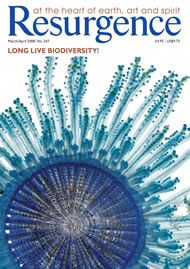PETER ABBS IS well known to readers of Resurgence as the editor who has married the often contradictory worlds of professional poetry and ecological values. Both worldviews are manifest in The Flowering of Flint, his handsome new volume. This Selected Poems draws on Abbs’ seven collections since 1978, and finishes with seven new poems. Whether or not this symmetry is of any numerological significance, it creates a portrait of both the poetic development of this unusual writer and the way human preoccupations recur – to the point where they may be said to have shaped a life.
Abbs’ life in writing has been admirably rich. Now Research Professor of Creative Writing at the University of Sussex, he has edited Earth Songs, an anthology of eco-poetry, and has written widely on the ecology of the writing process. Yet this outer life makes itself felt only rarely in these pages. Recurring themes are an impoverished rural childhood near the Norfolk coast; ‘Intimations of Mortality’; the tensions of familial and romantic relationships; and – starting with only the second poem in the book, a riddle whose title is its own answer – ‘The Word’:
You suggest and provoke until I chase […]
If that sounds like an invocation of the poet’s ‘Coy Mistress’: here as elsewhere language is the “tantaliser”, all “lithe movement”. This graceful early poem twists and turns on the page like a pictured dancer. But those capital letters – ‘The Word’ – and their Christian resonance combine strikingly as a challenge to which Abbs returns even in ‘Finding Words’, the very last poem of this volume: “I have often heard it said that word and world | have fallen out of their ancestral marriage…”
That challenge is resolved in the dream of a “testament of fire”; and Peter Abbs’ ‘Foreword’ is itself a Blakeian call to arms. “Poetry’s primary task is to break, blow, burn and make us new,” the poet argues, resisting the norms of his own successful life: “I would like to think that I am not comfortably settling down, but keeping faith with the ineffable spirit of life itself.” Elsewhere, that life-spirit is deeply rooted in personal geographies: among ‘Generations of Farm Hands’, whose silence Abbs writes to liberate; in ‘Oak Woods’, where first glimpses of immanence interrupt childhood games – “I go down the green passage to the open door, | Splinters of God lie in the melting grass” – and especially, with Methodist grandparents, in ‘Myrtle Cottage at West Runton’. These often plangent memories are explored in an extended sequence of sonnets, ‘Fragments from a Catholic Childhood’, from Abbs’ third collection, Icons of Time (1991). The sonnet – a form identified with love-poetry – is a significant choice for these letters to a lost family. That Abbs chooses to lock tight the memories they evoke with a closing full rhyme, often the only one in each poem, is particularly resonant. At once open and closed, this structure articulates something of the ambivalence the pieces evoke. An accompanying sequence, ‘Father and Son’, addresses the poet’s parent directly.
Many of the preoccupations of that collection return in 2005’s Viva La Vida: which also includes the present volume’s title poem, and an ‘Ars Poetica’ which raises the stakes for poetry – and for all makers – in ways prefigured by 1997’s Angelic Admiration. Many of the pieces Abbs has chosen to preserve from this volume are hommages to artists (Bonnard, Vermeer) or poets (Shakespeare, Celan, Rilke). A number, such as ‘Angelic Imagination’, are lent grace where they serve as elegies. Possibly Abbs’ strongest book to date, though, is Love After Sappho (1999), in which the twin urgencies of love and death compress what is elsewhere reflective and, to a degree, detached. The music of the resulting poems is deeper and more vivid: notably in ‘A White Dark-Scented Rose’, whose apparently paradoxical title sets up the poem’s “words that run obliquely, | That never quite declare their aim”; where the unspoken is “Like that, but not like that at all” and where a relationship must enter “an estrangement which feels like home”. Estranged too, and yet perfectly balanced, is a farewell to the poet’s mother, ‘Travelling to a Foreign Land’. In its detail – “I hold your frail veined hands. | Put vaseline on your lips, lavender water | On your brow” – as much as its conclusion – “I squeeze your hands and kiss your dried out lips – | As the vessel of our lives drifts to the precipice” – we find the sincerity by which poetry, when it does so, “makes us new”.







